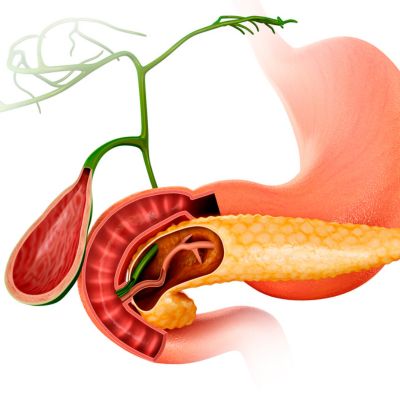1,070 Hoosiers are expected to die from pancreatic cancer in 2022 according to the Cancer Statistics Center. Along with early detection, pancreatic cancer surgery is essential for beating that number and keeping our citizens healthy. Fortunately, there are a number of surgical options for those suffering from the condition.

They include:
- Minimally invasive pancreatic resection
- The Whipple’s procedure
- Distal pancreatectomy
- Total pancreatectomy
- Removing part of a vein
1. Minimally Invasive Pancreatic Resection
Minimally invasive pancreatic resection (MIPS) is the surgical removal of part or all of the pancreas. It’s a common procedure for pancreatic cysts as well as cancer and is a popular option since it’s less invasive than traditional “open surgery.” MIPS uses small “keyhole” incisions rather than a single large opening, benefiting patients both during and after surgery.
Also known as laparoscopic surgery, minimally invasive surgery is possible thanks to the laparoscope. This special fiber optic tool has a camera and light on the end that transmits high-definition images to a video monitor. This allows our surgeons to see what they’re doing in real-time without having to create large incisions.
Minimally invasive surgery isn’t limited to pancreatic resections. It can be applied throughout the body to treat hernias, heart surgery, and even brain surgery just to name a few. This helps to ensure the best outcomes and a faster recovery for you and your loved ones.
The Benefits of Minimally Invasive Surgery
Open surgery is what most people think of when they imagine surgical procedures. However, the smaller incisions used in minimally invasive surgery provide many more benefits for patients. For these reasons, our surgeons will opt for this method whenever possible.
The benefits of minimally invasive surgery include:
- Smaller scars
- Shorter hospital stays
- Lower risk of infection
- Reduced pain after surgery
- Reduced risk of bleeding during and after surgery
Although minimally invasive options are available for many cases, open surgery may still be the best option for some patients. This is because open surgery is more effective when it comes to:
- Implanting materials such as stents
- The complete removal of tissue
- Making an accurate diagnosis
- Making effective repairs
Whether you qualify for minimally invasive surgery or not will be decided by your surgeon. They will be able to evaluate your particular situation and determine whether minimally invasive surgery or open surgery is the best option for you.
Click here to learn more about minimally invasive surgery!
2. The Whipple’s Procedure
The Whipple’s procedure is the most common form of surgery for pancreatic surgery. It is ideal for removing tumors from the head of the pancreas, which is its widest part.
During the Whipple’s operation, the head of the pancreas is removed along with the:
- Lower part of the stomach
- First part of the small intestine (duodenum)
- Gallbladder
- Part of the bile duct
- Nearby lymph nodes
The gallbladder aids in digestion by storing bile and the bile duct is what carries bile to the duodenum from the liver. Lymph nodes support your immune system by filtering out substances in the lymphatic fluid.
To make up for these removed parts, your surgeon will connect your stomach and bile duct to the small intestine. The pancreas is then joined to the stomach or small intestine so the system remains functioning.
You may still require further treatment to aid in digestion. This may involve medication for pancreatic enzyme replacement therapy, or PERT for short, so that you can continue to digest food normally. The Whipple’s procedure also increases your risk of diabetes after surgery. This can occur at any time, so it’s important to discuss how to take care of yourself with your surgeon after your procedure.
To learn more about the gallbladder and cases in which it may need to be removed, click here!
3. Distal Pancreatectomy

Distal pancreatectomy involves the removal of the body and tail of the pancreas. The spleen is usually removed during this procedure as well, also known as a splenectomy. The spleen is a very important part of your body since it helps ward off infections. This means that special precautions must be taken before and after your procedure to help protect your health.
This includes:
- Vaccinations before and after surgery
- Possibly requiring antibiotics for the rest of your life
- Carrying a card saying you don’t have a spleen in case you become sick
As with the Whipple’s procedure, distal pancreatectomy also increases your risk of diabetes so you may require insulin. You may also require pancreatic enzymes to aid in digestion. However, this is less likely to occur after a distal pancreatectomy than after a Whipple’s procedure.
4. Total Pancreatectomy
A total pancreatectomy is the complete removal of your pancreas. Your surgeon may recommend this procedure if you have:
- A large tumor
- More than one tumor
- An unhealthy pancreas
A total pancreatectomy involves the complete removal of the pancreas as well as:
- The duodenum
- The gallbladder
- Part of the bile duct
The spleen and stomach may also need to be removed in some cases. This can depend on where the cancer is specifically located. Your doctor will explain which parts will be removed, if any, and why.
5. Removing Part of a Vein
Cancer can develop around important blood vessels near the pancreas such as the portal vein and superior mesenteric artery. In cases like these, the cancerous part of the vein may need to be removed followed by joining it back together to restore the vein’s functionality. This process is known as vein resection and construction.
Reconstructing a vein can be done using part of a vein from another area of your body or with artificial material (grafting). This can make the surgery more complex and can take longer. It can also be more difficult since you may need to be in good shape for the procedure to be successful.
Do you need pancreatic cancer surgery in Evansville, IN? Call us at (812) 424-8231 or (800) 264-8231 to schedule your appointment!
Minimally invasive pancreatic resection is ideal for removing pancreatic cancer as well as cysts. The Whipple’s procedure involves removing parts of the digestive system and reconstructing it so it can still function. Distal pancreatectomy involves the removal of the body and tail of the pancreas and usually the spleen. You may undergo a total pancreatectomy if you have a large tumor, more than one tumor, or an unhealthy pancreas. Removing part of a vein can be necessary if you develop cancer around important blood vessels.
Evansville Surgical Associates has been providing comprehensive and compassionate surgical care for over 50 years. Call us at (812) 424-8231 or (800) 264-8231. We are available from 8:00 am to 4:30 pm if you would like to schedule an appointment.



